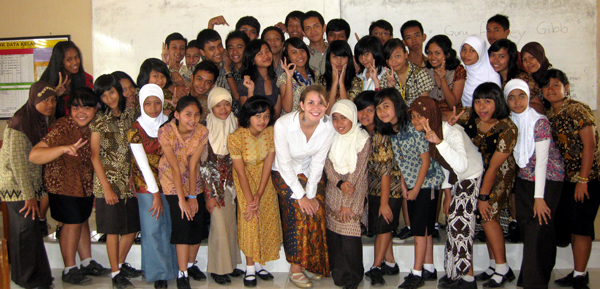From Science Education in Indonesia to Nanomaterials
March 2012
Although Ashley Gibb has only been a BASIS volunteer for one year, community science outreach is not new to her. She’s been doing this since she was an undergrad and has no plans to stop.

In Indonesia, Ashley worked with teachers, developed lessons, and demonstrated experiments for groups of students. She found it challenging to find chemicals and materials for experiments both due to the resource constraints and the different names for chemicals in Indonesia. Although she hopes to pursue the development of low-budget, effective science lessons in the future, for now she is bringing her years of teaching experience to the East Bay. As a BASIS volunteer, Ashley teaches the lesson “States of Matter: Sublime Suds/Ice Cream Science.” Through this lesson, students learn about states of matter and how different materials transition between these states and see liquid nitrogen and dry-ice demonstrations.
Like every great teacher, Ashley is excited about having students relate science concepts they already understand to new concepts, trying to challenge all students, and answering the multitudes of questions students have. In a recent classroom lesson, Ashley had students answering questions about solids, liquids, and gases. Their previous science lesson had covered the solar system and as she asked questions, her 3rd graders started relating planets to states of matter. By asking these questions and making the lessons hands-on and interactive, Ashley is able to challenge each student, regardless of how much they know about science, to think of new ideas, and to relate what they learn in class to the world around them.
When she combines liquid nitrogen and 3rd graders, Ashley inevitably gets many questions such as “what if I put my eyeball in liquid nitrogen?” Although teachers always try to keep their classes focused and support her as a volunteer, Ashley enjoys and encourages her students to ask questions. This enthusiasm contributes to the lessons and makes them better. Also, Ashley says, “going into a classroom with enthusiastic kids is just a simple reminder of my own love of science, which is especially nice when research isn’t working.”
Although her graduate research is focused at the microscopic level, on developing and characterizing novel boron nitride nanomaterials, Ashley’s outside interest in developing cheap, effective, and repeatable lessons for resource-limited schools in Third World countries spans to a big picture. This coming semester, in addition to working with young students through the BASIS program, Ashley will be teaching undergraduates at UC Berkeley. Although these students might not have the same questions about effects of liquid nitrogen on living tissues, they will be lucky to have an experienced, skilled, and enthusiastic teacher.
Ashley is currently studying to pass her qualifying exams, but she is already a qualified teacher in many ways and a great example to young students . CRS is lucky to work with Ashley and wishes her the best of luck with her exams and in developing science lessons in Indonesia and elsewhere in the future!
Photo above: Ashley with one of her classes during her time in Indonesia